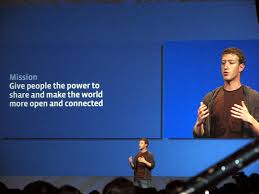Facebook’s Global Expansion
Social network giant Facebook have recently announced its promise to unite two-thirds of the world that lack cyber connectivity. Following Facebook’s billion user reach in 2012, the social network aimed to formulate more users around the world. Founder Mark Zuckerberg stresses the fact that “most people in the world don’t have any internet access at all”. For instance, only 13% of the Indian nation are able to access the Internet according to Internet.org. This is a significantly low figure.
By further adding connections will bring about a transformation in global connectivity. Zuckerberg intends to include Facebook in a set of projects aimed at distributing internet access to emerging markets. Connecting the international community through the online sphere will require the invention of new highly advanced technology. There has been limited information about Facebook’s plans to use a fleet of solar-powered drones as well as low-earth orbit and geosynchronous satellites to link the developing world. An inclusion of invisible, infrared laser beams would also be utilized to enhance the speed of internet connections.
Facebook’s new Connectivity Lab isaimed to conduct research and undergo experiments with the drones, satellites and lasers. This will determine the reach of Internet to isolated locations. This places Facebook in direct competition with Google, who’re proposing to distribute net access through solar-powered balloons, which were launched in New Zealand in June 2013. Last year, Facebook formed acoalition with majorinternational tech companies to create Internet.org, paving the way to enable net access to remote areas. This had been achieved through conventional methods such as making it cheaper to obtain Internet on mobile phones.
Facebook attained a result of an addition of 3 million more people online. Concerns have been raised over the philanthropic aspect of Facebook’s ambitions to broaden its 1.2 billion audiences. Essentially, Zuckerberg is trying to pursue a basic human right of providing access of information to rural international communities. However, fears over the underlying personal interests that may be driving this supposed altruistic project have come to surface. By increasing the total of internet connections, it multiplies Facebooks users and the amount of sharing undertaken online. Thus, it creates more openings for online advertising which accelerates its revenues significantly.
It is clear that political communities are questioning Facebook’s motives.What are they really trying to achieve? Millions of dollars are being poured into advanced satellite technology to ensure Internet access is received globally. Whereas, a more pressing international concern is poverty rather than Internet connectivity.How are people able to afford mobile phones, when they barely consume clean water nor receive electricity? This raises significant questions over Facebook’s personal interests.
Within the global sphere. Facebook’s global connectivity is highly responsible for the expansion of the ‘global knowledge economy’. Zuckerberg’s primary mission is to connect the entire world through the online sphere. We are yet to see how Facebook comes to shape the international global community. The future of the interconnected world lies in the hands of media mogul Mark Zuckerberg.




